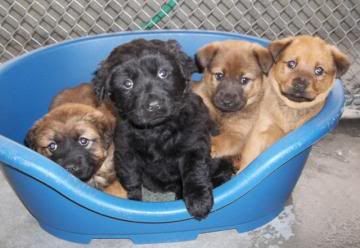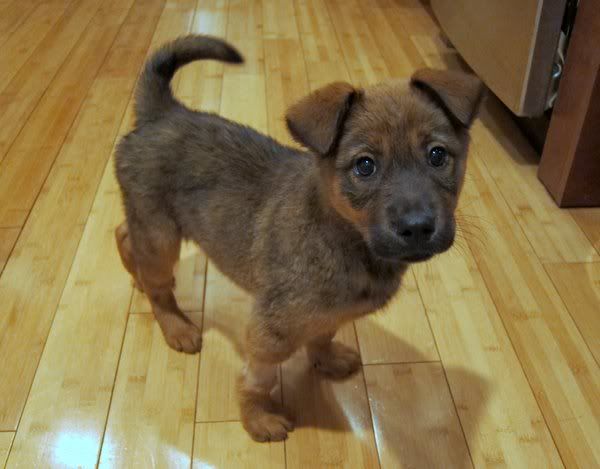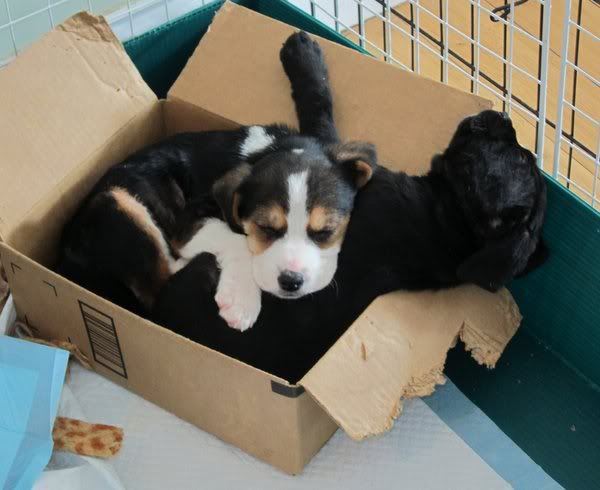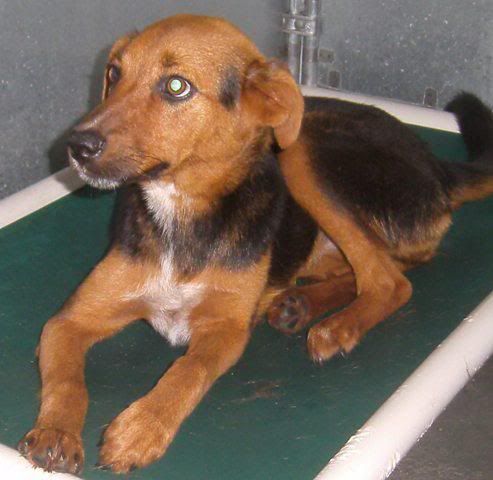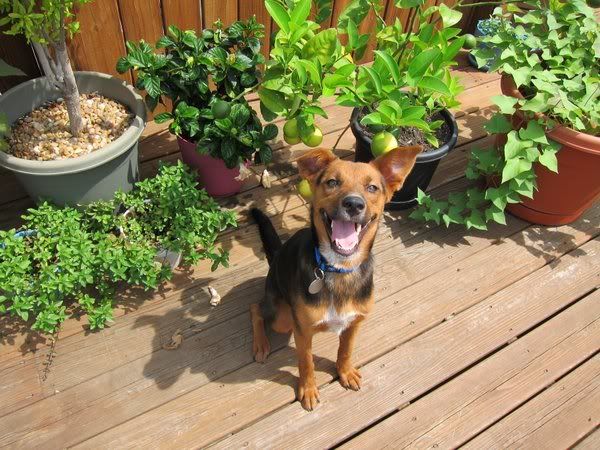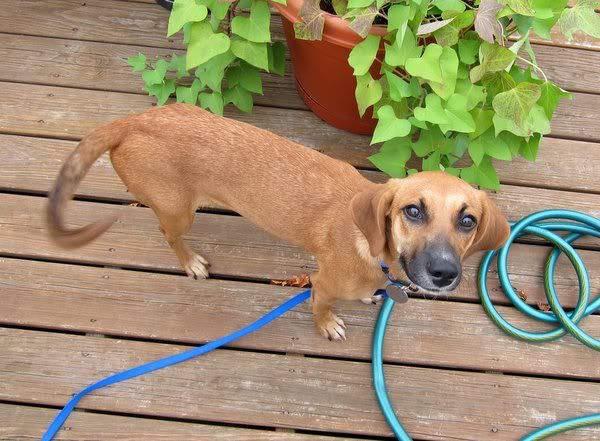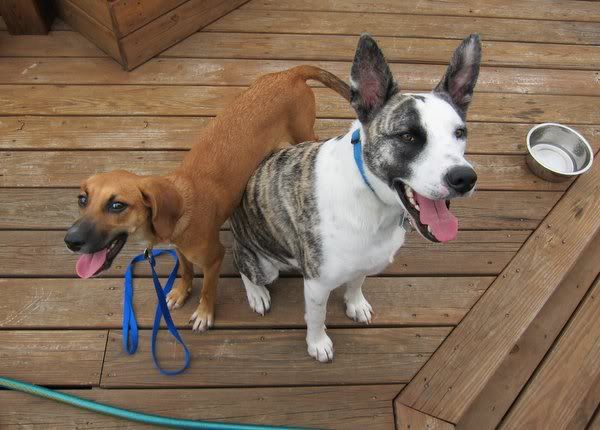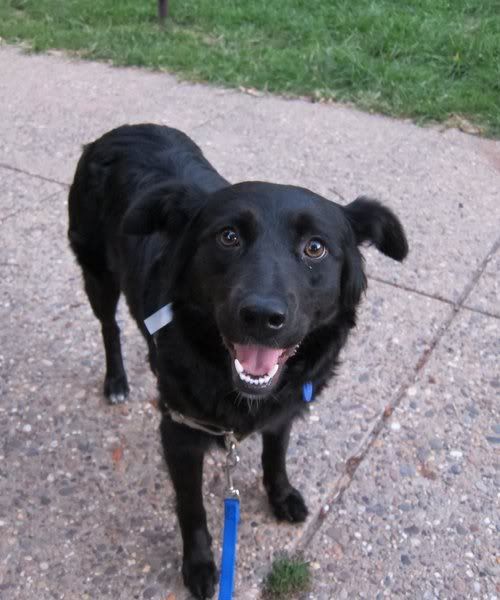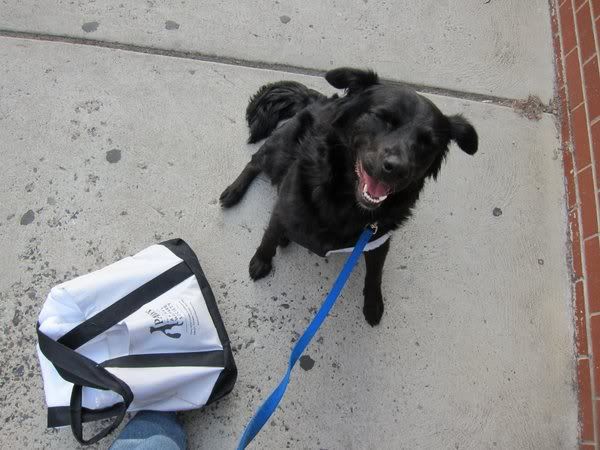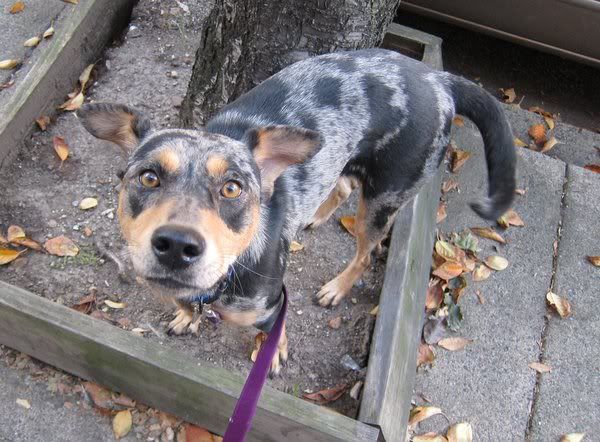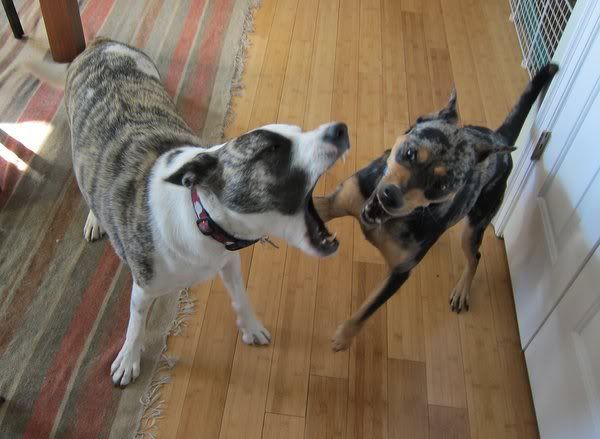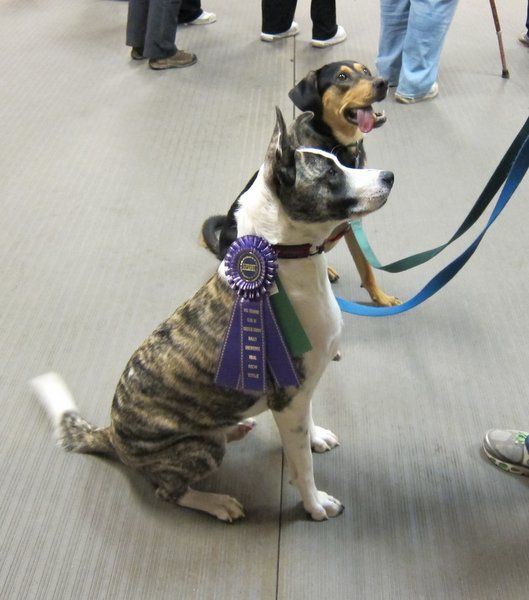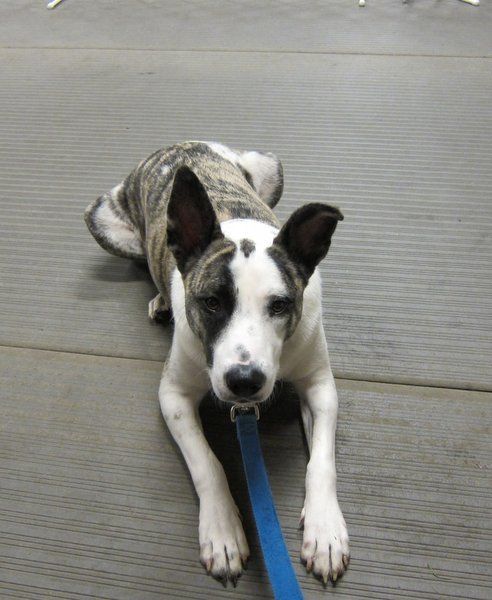Looking back on 2012, Dog Mob and I achieved all the goals we'd set for ourselves, and then some.
Pongu didn't title in freestyle... but that was because we switched our primary sport to Rally Obedience, so he had to learn a whole new system of rules and exercises, and within a few months of picking that up, he started trialing and soon earned his RL1 title with an Award of Excellence.
Crookytail wasn't on the goal list for 2012, because he wasn't even here yet, but he joined Dog Mob and promptly turned his skills to helping 11 foster dogs learn to live safely and happily with people in the big city. He also went from zero to titled, picking up his RL1 in Rally Obedience this year.
The Temporary Dogs numbered 12 in all. Eleven of those dogs went on to wonderful, loving homes; sadly, we lost puppy Erin to parvovirus.
We're still in contact with many of the other former Temporary Dogs' families, and it is incredibly rewarding to see their happy faces and grand adventures as they go on in their new lives.
So, for next year, here are our goals:
With Pongu, I hope to earn a RL2, RL1X, and ARCH. If we're lucky and I can afford an ambitious trialing schedule, we might go as far as the RL3, which would put us in a great position to make 2014 the Year of Rally Championships. Also, I'm gunning for an Award of Excellence at both Level 2 and Level 3 -- he did it at Level 1, which was the hardest for a crazypants scaredymutt because it was his first time in the ring, so why not at the more advanced levels too?
Regardless of how far we actually get, we'll continue trialing in APDT Rally.
I'd also like to go back to WCFO musical freestyle with Pongu. We switched sports because I just didn't feel like I knew what I was doing in freestyle; now that I have more confidence and slightly more of a clue, it might be time to try it again. We'll have to rely on video competitions, which will be an adventure in itself, but I think it should be possible for us to get a beginner or novice title next year.
With Crookytail and Pongu both, I plan to take the Canine Good Citizen test early next year. For a long time, the CGC test was beyond what I believed Pongu could do; he was just too fearful to handle being approached by a stranger or left alone with me out of sight.
I think Pongu can handle it now, though, and I don't expect the CGC test to be particularly difficult for Crookytail. The test is more about the dog's stability than learned behaviors (the amount of formal training required to pass a CGC evaluation is really very little), and Crooky has never really had a problem with staying level-headed. So we'll knock that out early in the spring, whenever it's next offered around here, and let Dog Mob add a few more letters to their names.
On the foster front, the goal is to have five or six Temporary Dogs pass through here in 2013. My schedule may end up being pretty full of other things next year (particularly if I spend a lot of time trialing with Pongu), so we may have to step that back from what we did this year -- but as helping with fosters is Crookytail's primary job and I want him to have a chance to excel at his work too, we won't drop it entirely.
We may end up doing a little more or less than that, but right now one foster dog every other month seems like a manageable rate, so that's the goal I'm setting for next year. Whoooo!!
Thursday, December 13, 2012
Wednesday, December 12, 2012
2012 in Fosters - A Retrospective
As 2012 winds to a close, it's time to reflect on the foster dogs who came through this house in the past year.
Just like in 2011, all our fosters came from Southern states: Georgia, Tennessee, and North Carolina. They were adopted out all across the country: Pennsylvania, New Jersey, Alabama, Wisconsin, and Vermont are homes to our fosters now.
Here are the fosters we housed in the past twelve months.
1. Crookytail the Benevolent, RL1 (January 2012)
The One Who Stayed
Crookytail was my first pull from Robeson County, North Carolina. RCAS and neighboring Sampson County became the focus of my rescue efforts in 2012, in part because Liberty County's rescue team became so successful that their shelter's save rate went from 2% to 98%, and thus all the dogs I wanted to pull were spoken for before I got to them. Also, I'd gotten more confident about my ability to pick out good dogs instead of relying on other people to choose them for me.
Thus began the Era of Crookytail, in which he added his considerable talents to our fostering team, and everything got way better than it had ever been before. All the fosters start smiling in their pictures a lot more once Crooky joins the team.
This year, Crookytail went from a dog with absolutely no formal training to a titled Rally Obedience dog. Granted, he didn't love the sport and is retiring as a RL1, but I'm still proud of him, and in 2013 he'll be able to get back to his real job: guidance counselor to foster dogs.
2 and 3. Jackie and Erin (March 2012)
The Trailer Park Kids
After Crooky joined us as a permanent dog, I did puppies for a while because I didn't think I could handle three full-sized dogs. Little did I know that puppies are actually a WAY bigger pain in the ass. Jackie and Erin, the two on the right in that picture, were the first of our foster puppies. They were "found" in a cardboard box in a trailer park (in reality, the person who claimed to have "found" them was probably their owner who just didn't want to be held responsible for dumping a litter of puppies).
Because dogs in Robeson County frequently get no preventative care or vaccinations whatsoever, both of these puppies came down with parvo a few days after I pulled them. They had to go into the doggy ICU and get IVs for a few days. All told, their vet care cost about a thousand bucks, and Erin died anyway. Jackie survived and made it to Philly. She got adopted two days later.
4 and 5. Cerise and Razzmatazz (March - April 2012)
The Burnout Babies
I'll tell you a secret: even the best foster parents don't always love all their dogs.
These two were my least favorite fosters ever. It wasn't their fault, but I still never liked them very much. They had sarcoptic mange and were being treated with lime-sulfur dips, so they smelled terrible and I had to give them medicine four times a day and wash my hands every time I touched them and Dog Mob had to take preventative medicine too. Because they were itchy and miserable, they just wailed constantly and scratched all the time and were basically impossible to train. Because they were hound mixes, their wailings were LOUD, which did not endear them to me, as we live in a condo and our next-door neighbor was a doctor who was eight or nine months pregnant at the time and already not sleeping well.
We had these puppies for two weeks, then Cerise got adopted and Razz went to go stay with a lady who was fostering one of her other littermates.
6 and 7. Indy and Little Fox (April - May 2012)
The Melon Collies
These two little monsters were a couple of collie mixes that I pulled from North Carolina. Their mother was a collie mix; their fathers were probably two different dogs. Little Fox's father was definitely a German Shepherd (her owners were kind enough to tell the shelter staff that as they were dumping the mother), but Indy's father was most likely a yellow Lab or Lab mix.
A friend of ours decided to adopt Indy (the beige one), so I kept her a couple more weeks for basic training and put Little Fox up for adoption. Little Fox got adopted by a very nice older couple in Bucks County. Indy lives in Alabama with our friend now, where she eats his furniture and destroys his remote controls and is generally a massive troublemaker. I told him that was going to happen, but he insisted he wanted the tomboy and not the polite little lady, so that's what he gets.
After those two left, I decided I was never doing puppies again. NEVER.
8. Mab (June - July 2012)
The Smart One
That summer, some more friends decided that they wanted to adopt a dog, so they contacted us for help picking one out. I sent them a couple of possible candidates and they chose Mab, a little black border collie in RCAS. Mab got out of the shelter with about 90 minutes to spare. She turned out to be the smartest foster we've ever had -- just ridiculously quick to learn and easy to train. If she hadn't already been promised to our friends, I would have been sorely tempted to keep her, but as is I'm just delighted that she went on to such a good home. She lives in Vermont now and has a wonderful extended family of dogs.
9. Eldwin/Etta (August 2012)
The Happy One
Eldwin, who was later renamed Etta, was another foster dog that I was briefly tempted to keep. She was a little shepherd mix who came out of RCAS and also proved to be super smart, as well as happy and smiley and instantly endearing. Luckily she got an adoption commitment from a dream home with a young couple in Philly within two or three days of arrival, so I could file her away mentally as "taken" and stop myself from getting too attached. She was only with us for ten days, and it's a good thing, too. Any longer and she might never have left.
10. Tulip (August 2012)
The Short-Term Pee Sprinkler
I barely got to know Tulip, a beagle mix from SCAS who was in and out of here in less than 48 hours. She was sweet, but really timid and a major submissive urinator. Crookytail helped bring her around, and she showed a good bit of improvement in the short time she was here, but we didn't really have enough time to fix that issue, because Tulip got adopted almost immediately. Hooray, less pee mopping for me.
11. April (August - September 2012)
The Good Mama
April was a soft-hearted, gentle black Lab/border collie mix from rural Tennessee, where she had been found outside a branch bank with her daughter Scarlett. The local rescue hadn't been able to get her adopted, so they sent her and a few other dogs to my rescue group. Scarlett got adopted immediately (puppies always go first), one of our friends and his wife decided to adopt April soon after she got here, and I got to deal with the toughest potty-training case I've been faced with so far.
I owe a lot to the magic powers of Crookytail on this one. With his help, April was brought out of her depression and given a crash course in remedial socialization and successfully started on potty-training. She now lives with two cats in Wisconsin and is a very lucky dog. It turns out that she loves snow, which is good, because she'll be getting a lot of it out there.
12. Shelby/Sydney (October - November 2012)
The Box Dog
Shelby, later renamed Sydney, was yet another mama dog who sat in the shelter after her puppies had been adopted (although in Sydney's case, only one of her puppies actually got adopted -- the other died, probably of hookworms, before his adopters could pick him up). Although she was smart and sweet and blessed with exotic markings, no one seemed to want her. On her last day, the shelter director sent out a plea across Facebook for someone to pull this special little dog.
She was in rough shape when I pulled her; she was severely underweight and had a massive parasite load, including heartworms. Luckily, other generous people had been touched by the director's plea and donated hundreds of dollars to cover Sydney's medical bills. Even so, she had to spend a full month on crate rest before she could go up for adoption.
But Sydney came through heartworm treatment like a champ and proved to be an adaptable, friendly, quick-learning dog who went on to a great home in upstate New York with three other dogs. She was another one that I wanted to keep, because she was smart and had great hind-end awareness and a really nice natural side pass, but alas, I can't have three dogs. And she scored an excellent home, so I'm pretty happy with that.
And that is the recap of 2012 in foster dogs. In just a few more weeks, we'll saddle up to start again in 2013. Crookytail is excited and Pongu is filled with loathing at the prospect of bringing in some new foster fuzzbutts. I'm already scouting for prospects.
Just like in 2011, all our fosters came from Southern states: Georgia, Tennessee, and North Carolina. They were adopted out all across the country: Pennsylvania, New Jersey, Alabama, Wisconsin, and Vermont are homes to our fosters now.
Here are the fosters we housed in the past twelve months.
1. Crookytail the Benevolent, RL1 (January 2012)
The One Who Stayed
Crookytail was my first pull from Robeson County, North Carolina. RCAS and neighboring Sampson County became the focus of my rescue efforts in 2012, in part because Liberty County's rescue team became so successful that their shelter's save rate went from 2% to 98%, and thus all the dogs I wanted to pull were spoken for before I got to them. Also, I'd gotten more confident about my ability to pick out good dogs instead of relying on other people to choose them for me.
Thus began the Era of Crookytail, in which he added his considerable talents to our fostering team, and everything got way better than it had ever been before. All the fosters start smiling in their pictures a lot more once Crooky joins the team.
This year, Crookytail went from a dog with absolutely no formal training to a titled Rally Obedience dog. Granted, he didn't love the sport and is retiring as a RL1, but I'm still proud of him, and in 2013 he'll be able to get back to his real job: guidance counselor to foster dogs.
2 and 3. Jackie and Erin (March 2012)
The Trailer Park Kids
After Crooky joined us as a permanent dog, I did puppies for a while because I didn't think I could handle three full-sized dogs. Little did I know that puppies are actually a WAY bigger pain in the ass. Jackie and Erin, the two on the right in that picture, were the first of our foster puppies. They were "found" in a cardboard box in a trailer park (in reality, the person who claimed to have "found" them was probably their owner who just didn't want to be held responsible for dumping a litter of puppies).
Because dogs in Robeson County frequently get no preventative care or vaccinations whatsoever, both of these puppies came down with parvo a few days after I pulled them. They had to go into the doggy ICU and get IVs for a few days. All told, their vet care cost about a thousand bucks, and Erin died anyway. Jackie survived and made it to Philly. She got adopted two days later.
4 and 5. Cerise and Razzmatazz (March - April 2012)
The Burnout Babies
I'll tell you a secret: even the best foster parents don't always love all their dogs.
These two were my least favorite fosters ever. It wasn't their fault, but I still never liked them very much. They had sarcoptic mange and were being treated with lime-sulfur dips, so they smelled terrible and I had to give them medicine four times a day and wash my hands every time I touched them and Dog Mob had to take preventative medicine too. Because they were itchy and miserable, they just wailed constantly and scratched all the time and were basically impossible to train. Because they were hound mixes, their wailings were LOUD, which did not endear them to me, as we live in a condo and our next-door neighbor was a doctor who was eight or nine months pregnant at the time and already not sleeping well.
We had these puppies for two weeks, then Cerise got adopted and Razz went to go stay with a lady who was fostering one of her other littermates.
6 and 7. Indy and Little Fox (April - May 2012)
The Melon Collies
These two little monsters were a couple of collie mixes that I pulled from North Carolina. Their mother was a collie mix; their fathers were probably two different dogs. Little Fox's father was definitely a German Shepherd (her owners were kind enough to tell the shelter staff that as they were dumping the mother), but Indy's father was most likely a yellow Lab or Lab mix.
A friend of ours decided to adopt Indy (the beige one), so I kept her a couple more weeks for basic training and put Little Fox up for adoption. Little Fox got adopted by a very nice older couple in Bucks County. Indy lives in Alabama with our friend now, where she eats his furniture and destroys his remote controls and is generally a massive troublemaker. I told him that was going to happen, but he insisted he wanted the tomboy and not the polite little lady, so that's what he gets.
After those two left, I decided I was never doing puppies again. NEVER.
8. Mab (June - July 2012)
The Smart One
That summer, some more friends decided that they wanted to adopt a dog, so they contacted us for help picking one out. I sent them a couple of possible candidates and they chose Mab, a little black border collie in RCAS. Mab got out of the shelter with about 90 minutes to spare. She turned out to be the smartest foster we've ever had -- just ridiculously quick to learn and easy to train. If she hadn't already been promised to our friends, I would have been sorely tempted to keep her, but as is I'm just delighted that she went on to such a good home. She lives in Vermont now and has a wonderful extended family of dogs.
9. Eldwin/Etta (August 2012)
The Happy One
10. Tulip (August 2012)
The Short-Term Pee Sprinkler
I barely got to know Tulip, a beagle mix from SCAS who was in and out of here in less than 48 hours. She was sweet, but really timid and a major submissive urinator. Crookytail helped bring her around, and she showed a good bit of improvement in the short time she was here, but we didn't really have enough time to fix that issue, because Tulip got adopted almost immediately. Hooray, less pee mopping for me.
11. April (August - September 2012)
The Good Mama
I owe a lot to the magic powers of Crookytail on this one. With his help, April was brought out of her depression and given a crash course in remedial socialization and successfully started on potty-training. She now lives with two cats in Wisconsin and is a very lucky dog. It turns out that she loves snow, which is good, because she'll be getting a lot of it out there.
12. Shelby/Sydney (October - November 2012)
The Box Dog
Shelby, later renamed Sydney, was yet another mama dog who sat in the shelter after her puppies had been adopted (although in Sydney's case, only one of her puppies actually got adopted -- the other died, probably of hookworms, before his adopters could pick him up). Although she was smart and sweet and blessed with exotic markings, no one seemed to want her. On her last day, the shelter director sent out a plea across Facebook for someone to pull this special little dog.
She was in rough shape when I pulled her; she was severely underweight and had a massive parasite load, including heartworms. Luckily, other generous people had been touched by the director's plea and donated hundreds of dollars to cover Sydney's medical bills. Even so, she had to spend a full month on crate rest before she could go up for adoption.
But Sydney came through heartworm treatment like a champ and proved to be an adaptable, friendly, quick-learning dog who went on to a great home in upstate New York with three other dogs. She was another one that I wanted to keep, because she was smart and had great hind-end awareness and a really nice natural side pass, but alas, I can't have three dogs. And she scored an excellent home, so I'm pretty happy with that.
And that is the recap of 2012 in foster dogs. In just a few more weeks, we'll saddle up to start again in 2013. Crookytail is excited and Pongu is filled with loathing at the prospect of bringing in some new foster fuzzbutts. I'm already scouting for prospects.
Labels:
April,
Burnout Babies,
Crookytail,
Etta,
fostering,
Jackie,
Mab,
Melon Collies,
Pongu,
Sydney,
Tulip
Tuesday, December 11, 2012
Pongu Off Prozac
After many months of behavioral rehabilitation, I finally took Pongu off Prozac a couple of weeks ago.
Almost 18 months ago, he started on 20 mg/day of Prozac. A few months later, after consulting with several trainers and behaviorists, we upped that dose to 30 mg/day. At the same time we embarked upon the long, slow process of teaching Pongu how to cope with everyday life and handle his anxiety in safer and more productive ways. This took many, many months of very small steps.
We had some setbacks and we had some delays (and I got to learn firsthand about how much fun it is to try regular counter-conditioning protocols with a dog too fearful to accept even the tastiest treats anywhere outside his safe zone), but eventually we reached a point where Pongu could tolerate more noise and chaos than I ever imagined possible, and could even focus well enough to do Rally practice sessions on city sidewalks.
I don't think we would have made it without the medication. I doubt Pongu could have coped with his daily anxieties without Prozac, and I doubt he'd have gotten past his terror of training facilities without Xanax. The medications not only made it possible for him to calm down enough to focus, but enabled him to have fun -- and once he learned that he could have fun while working, the work itself became fun, and that built into a spiral of positive reinforcement that eventually gave him the ability to self-control and self-calm by doing something as simple as a Heel Sit. The familiarity of the exercise, and (I believe) its strong association with feelings of pride and accomplishment, really seem to enable Pongu to mentally regroup and switch from fearful mode to thinking mode.
Once he earned his RL1 with an Award of Excellence -- a goal that I honestly was not sure this fearful little mutt would ever accomplish, since back in the early days all the trainers we'd consulted had cautioned me not to expect Pongu to ever trial in any sport (which, looking back on it with the benefit of what I know now, I believe was mostly hedging against the great uncertainty of owner compliance) -- I decided that it was time to phase out the Prozac. He was doing well enough that I didn't think we needed it anymore, and even though he'd been on it for a long time, I was and still am a little uncomfortable about using behavioral medications longer than strictly necessary.
Besides, there were some slight side effects. The biggest one was that Prozac gave Pongu a dry mouth, which in turn caused his teeth to get dirty a lot faster than Crookytail's did. I was worried that longterm use might compromise his dental health.
So I spent a month weaning him off the medication, dropping his daily dose from 30 mg to 20 mg to 10 to nothing. I noticed no behavioral changes during the period of decreased doses, but 4 or 5 days after he was totally off the medication, his behavior did start to change a little.
Pongu is now quicker to startle at unexpected noises or movements. He seems more vigilant when out on walks. He is noticeably more reactive to strange people and dogs; he'll go into barking/lunging episodes at longer threshold distances and more frequently than when he was on Prozac. It's not such a tremendous change that I feel a need to put him back on the medication, but it's a noticeable change.
He doesn't sleep through the night as soundly; he will wake up and rush to the door barking when the neighbor leaves for work around 6:30, which he didn't do before, and sometimes he wakes up and barks at strange noises outside. He seems more insistent about pushing against me for petting and cuddles (and won't go back to sleep until I pet him a little), which I interpret as linked to anxiety.
However, not all the behavioral changes are bad. Pongu used to be somewhat anorexic -- he'd regularly refuse meals if he was bored with a particular kind of food -- and his appetite seems better since he went off Prozac. His reaction times are faster and he's more responsive during practice sessions (sometimes overly responsive, in fact; I'm having to adjust my cues to compensate). He seems more athletic; he's more energetic during jumpwork sessions and while practicing on stairs. The overall effect seems to be like lifting off a layer of cotton wool that had been muffling certain aspects of his personality, for good and ill.
It seems like we've settled into the new reality, and it's not bad. Pongu can still focus in environments that would previously have overwhelmed him, and he can still trial successfully in APDT Rally. So, for the time being, the plan is to keep him drug-free and see where the new year takes us.
Almost 18 months ago, he started on 20 mg/day of Prozac. A few months later, after consulting with several trainers and behaviorists, we upped that dose to 30 mg/day. At the same time we embarked upon the long, slow process of teaching Pongu how to cope with everyday life and handle his anxiety in safer and more productive ways. This took many, many months of very small steps.
We had some setbacks and we had some delays (and I got to learn firsthand about how much fun it is to try regular counter-conditioning protocols with a dog too fearful to accept even the tastiest treats anywhere outside his safe zone), but eventually we reached a point where Pongu could tolerate more noise and chaos than I ever imagined possible, and could even focus well enough to do Rally practice sessions on city sidewalks.
I don't think we would have made it without the medication. I doubt Pongu could have coped with his daily anxieties without Prozac, and I doubt he'd have gotten past his terror of training facilities without Xanax. The medications not only made it possible for him to calm down enough to focus, but enabled him to have fun -- and once he learned that he could have fun while working, the work itself became fun, and that built into a spiral of positive reinforcement that eventually gave him the ability to self-control and self-calm by doing something as simple as a Heel Sit. The familiarity of the exercise, and (I believe) its strong association with feelings of pride and accomplishment, really seem to enable Pongu to mentally regroup and switch from fearful mode to thinking mode.
Once he earned his RL1 with an Award of Excellence -- a goal that I honestly was not sure this fearful little mutt would ever accomplish, since back in the early days all the trainers we'd consulted had cautioned me not to expect Pongu to ever trial in any sport (which, looking back on it with the benefit of what I know now, I believe was mostly hedging against the great uncertainty of owner compliance) -- I decided that it was time to phase out the Prozac. He was doing well enough that I didn't think we needed it anymore, and even though he'd been on it for a long time, I was and still am a little uncomfortable about using behavioral medications longer than strictly necessary.
Besides, there were some slight side effects. The biggest one was that Prozac gave Pongu a dry mouth, which in turn caused his teeth to get dirty a lot faster than Crookytail's did. I was worried that longterm use might compromise his dental health.
So I spent a month weaning him off the medication, dropping his daily dose from 30 mg to 20 mg to 10 to nothing. I noticed no behavioral changes during the period of decreased doses, but 4 or 5 days after he was totally off the medication, his behavior did start to change a little.
Pongu is now quicker to startle at unexpected noises or movements. He seems more vigilant when out on walks. He is noticeably more reactive to strange people and dogs; he'll go into barking/lunging episodes at longer threshold distances and more frequently than when he was on Prozac. It's not such a tremendous change that I feel a need to put him back on the medication, but it's a noticeable change.
He doesn't sleep through the night as soundly; he will wake up and rush to the door barking when the neighbor leaves for work around 6:30, which he didn't do before, and sometimes he wakes up and barks at strange noises outside. He seems more insistent about pushing against me for petting and cuddles (and won't go back to sleep until I pet him a little), which I interpret as linked to anxiety.
However, not all the behavioral changes are bad. Pongu used to be somewhat anorexic -- he'd regularly refuse meals if he was bored with a particular kind of food -- and his appetite seems better since he went off Prozac. His reaction times are faster and he's more responsive during practice sessions (sometimes overly responsive, in fact; I'm having to adjust my cues to compensate). He seems more athletic; he's more energetic during jumpwork sessions and while practicing on stairs. The overall effect seems to be like lifting off a layer of cotton wool that had been muffling certain aspects of his personality, for good and ill.
It seems like we've settled into the new reality, and it's not bad. Pongu can still focus in environments that would previously have overwhelmed him, and he can still trial successfully in APDT Rally. So, for the time being, the plan is to keep him drug-free and see where the new year takes us.
Monday, December 10, 2012
Crookytail Titles and Retires (Temporarily?)
Dog Mob had another Rally trial yesterday. It was just one run each: Pongu moved up to Level 1B (championship division), while Crookytail was trying to get his last leg in Level 1A (titling division) and earn his RL1.
Spoiler: They both did very well and I am so, so proud of them.
Pongu, my little crazypants spazzlebutt, turned in his best run ever and scored 208 out of a possible 210 points. Going in, I was a little worried: this was Pongu's first trial since getting off Prozac, and while he's generally coping quite well without the medication, he's become noticeably more reactive and quick to startle. I wasn't sure how he'd do in the trial environment.
Obviously, I needn't have worried. He was confident, happy, and focused throughout, and although we did make a couple of tiny errors (partly my fault -- my handling is not as clear as it should be!), I could not be happier with Pongu's performance. This is just his fourth trial experience of any kind ever, and in my opinion he's doing brilliantly.
We are going to rock some trials next year. Pongu needs another nine Qs in Level 1B to earn his RL1X title, and 82 points plus 5 Level 1B/2B QQs at 190 or higher to earn his ARCH (which is the one I really want, because doesn't that just look impressive?). I'm hoping to get the remaining Level 2 exercises to a comfortable level of proficiency by the end of the month, so we can start competing in that level right away next year. The next trial in our area is in January, and I'm hoping to be ready by then. With luck, we may have Pongu's first championship title by August or September.
It'll just be me and Pongu, though, because Crookytail is retiring from Rally after completing his first title.
Crooky has never enjoyed competitions. This is the face he made for almost the entire time he was waiting on his turn in the ring:
Crookytail generally enjoys practice, I think, although he has always been inconsistent in his performances. One day he'll be brilliant, the next day he's completely deaf to my requests and would much rather stare at the Squirrel Tree in hopes of spotting a furry gray snackbite.
But most of the time, at home and on the street, he seems to like playing the game.
This enjoyment vanishes instantly in the trial venue. Even before we set foot in the ring, Crookytail gets anxious and stressy and starts pleading to leave. Once in the ring, he really does try hard, but he doesn't seem to like it. I never get the sense that Crookytail is having fun, as opposed to dutifully trying to make me happy.
Crookytail earned a score of 188 at yesterday's run. It was the second-lowest qualifying score of any dog in the division. Again, some of the errors were my fault for sloppy handling, but a lot of it was that Crooky just wasn't that into it. He had his moments of brilliance and stretches of good heeling, but overall it was just... adequate.
Adequate is still good enough, though. I promised Crooky that if he earned his title, I'd let him quit doing competitions (at least for a while). He did it, so he gets an honorable discharge from the ring.
I may bring him back down the road. Crookytail does show promise, and when he's on his game, he can execute the movements with great flair and precision. For him, it's just a matter of building value into the exercises, so that they become fun and rewarding in and of themselves. I don't think that this would be too difficult; I'm just not sure I should make it a priority. I don't need him to love Rally -- or any sport, for that matter. He has a job already. And when I'm actively fostering, I honestly do not have time to train Crooky to a competition level. So, at least for the time being, I'm content to let him retire.
Crookytail's career scores reflect his general inconsistency: 186, 198 (and third place!), 188.
Pongu's reflect his steady gain of confidence in the ring: 196, 198, 201, 208.
And so we close out Dog Mob's run in APDT Rally for 2012. Both dogs entered the sport for the first time this year, and both of them earned their beginner titles in short order. Not bad for a couple of muttly pound dogs. I do believe they're the only dogs in our neighborhood who have any title (other than maybe a couple of CGCs, and I'm honestly not sure we even have any of those around), and I am inordinately proud of them for that.
All hail Crookytail the Benevolent, RL1, and Pongu the Insane, RL1 (AOE).
Spoiler: They both did very well and I am so, so proud of them.
Pongu, my little crazypants spazzlebutt, turned in his best run ever and scored 208 out of a possible 210 points. Going in, I was a little worried: this was Pongu's first trial since getting off Prozac, and while he's generally coping quite well without the medication, he's become noticeably more reactive and quick to startle. I wasn't sure how he'd do in the trial environment.
Obviously, I needn't have worried. He was confident, happy, and focused throughout, and although we did make a couple of tiny errors (partly my fault -- my handling is not as clear as it should be!), I could not be happier with Pongu's performance. This is just his fourth trial experience of any kind ever, and in my opinion he's doing brilliantly.
We are going to rock some trials next year. Pongu needs another nine Qs in Level 1B to earn his RL1X title, and 82 points plus 5 Level 1B/2B QQs at 190 or higher to earn his ARCH (which is the one I really want, because doesn't that just look impressive?). I'm hoping to get the remaining Level 2 exercises to a comfortable level of proficiency by the end of the month, so we can start competing in that level right away next year. The next trial in our area is in January, and I'm hoping to be ready by then. With luck, we may have Pongu's first championship title by August or September.
It'll just be me and Pongu, though, because Crookytail is retiring from Rally after completing his first title.
Crooky has never enjoyed competitions. This is the face he made for almost the entire time he was waiting on his turn in the ring:
Crookytail generally enjoys practice, I think, although he has always been inconsistent in his performances. One day he'll be brilliant, the next day he's completely deaf to my requests and would much rather stare at the Squirrel Tree in hopes of spotting a furry gray snackbite.
But most of the time, at home and on the street, he seems to like playing the game.
This enjoyment vanishes instantly in the trial venue. Even before we set foot in the ring, Crookytail gets anxious and stressy and starts pleading to leave. Once in the ring, he really does try hard, but he doesn't seem to like it. I never get the sense that Crookytail is having fun, as opposed to dutifully trying to make me happy.
Crookytail earned a score of 188 at yesterday's run. It was the second-lowest qualifying score of any dog in the division. Again, some of the errors were my fault for sloppy handling, but a lot of it was that Crooky just wasn't that into it. He had his moments of brilliance and stretches of good heeling, but overall it was just... adequate.
Adequate is still good enough, though. I promised Crooky that if he earned his title, I'd let him quit doing competitions (at least for a while). He did it, so he gets an honorable discharge from the ring.
I may bring him back down the road. Crookytail does show promise, and when he's on his game, he can execute the movements with great flair and precision. For him, it's just a matter of building value into the exercises, so that they become fun and rewarding in and of themselves. I don't think that this would be too difficult; I'm just not sure I should make it a priority. I don't need him to love Rally -- or any sport, for that matter. He has a job already. And when I'm actively fostering, I honestly do not have time to train Crooky to a competition level. So, at least for the time being, I'm content to let him retire.
Crookytail's career scores reflect his general inconsistency: 186, 198 (and third place!), 188.
Pongu's reflect his steady gain of confidence in the ring: 196, 198, 201, 208.
And so we close out Dog Mob's run in APDT Rally for 2012. Both dogs entered the sport for the first time this year, and both of them earned their beginner titles in short order. Not bad for a couple of muttly pound dogs. I do believe they're the only dogs in our neighborhood who have any title (other than maybe a couple of CGCs, and I'm honestly not sure we even have any of those around), and I am inordinately proud of them for that.
All hail Crookytail the Benevolent, RL1, and Pongu the Insane, RL1 (AOE).
Tuesday, December 4, 2012
Motivation
Our dogs don't always want to do what we want them to do.
It doesn't mean they're being willful or stupid or (shudder) "dominant." It (sometimes -- more on this later) means that whatever you want them to do is not intrinsically fun for them, and whatever you're offering in exchange for the not-intrinsically-fun activity is just not good enough to be worth it. Put simply, they're not sufficiently motivated to play along.
I made this clip while practicing cavaletti with Dog Mob the other day. It's not a particularly good cavaletti clip, but it is a good illustration of a decidedly unmotivated dog.
Crookytail does not like practicing cavaletti. He doesn't especially care for most formal sports exercises, in fact. Like a lot of dogs, he just doesn't see the point. Dog sports involve a lot of really arbitrary and inefficient activities; it's not for nothing that people often say titles demonstrate that your dog loves you enough to do a bunch of really stupid stuff for your sake.
Crookytail believes, quite reasonably, that if the goal is for him to go to the mat, it is faster and more sensible to go around the cavaletti poles than high-step over them. He is a forgiving dog, and I think he feels uncomfortable expressing this too forcefully, but it's pretty clear he thinks I'm nuts for insisting that he take the annoying inefficient route of going over the poles instead of around them.
So, by the time I made this clip, he had just tuned out. The exercise appeared pointless to him and he didn't have enough motivation to do it, so he wasn't about to go through the hassle. (Pongu, on the other hand, is more willing to humor me -- but Pongu has been working with me for longer, so for him, the work itself and the reward of interacting with me is sufficient motivation to run the poles.)
Whenever a dog refuses to do an exercise, I find it helpful to rule out a few possible reasons for the refusal.
(1) Confusion -- does the dog understand the exercise? Perhaps my request is unclear, and the dog just isn't sure what he's supposed to do with all those poles.
In this case I know there's no confusion because Crookytail has been working cavaletti for weeks and knows what the goal of the exercise is. But often this is the first stumbling block, and indicates that I need to go back and break the exercise down into smaller, simpler pieces -- perhaps just one pole on the ground in front of the mat.
(2) Ability -- is the dog capable of the exercise? Perhaps I'm asking for more than the dog is physically able to give. Some dogs will actually strain to the point of injuring themselves in an effort to comply with their humans' requests, so it's vital to keep a close watch on our dogs for signs of injury or illness and never ask for more than they can do.
Here, I know that the height and spacing of the poles makes the exercise difficult but not impossible. The first pole is 8" high, the second one is 1/2" high and deliberately crooked, and the last one is 4" high. The poles are placed at intervals that discourage jumping (which would probably be more fun) and encourage careful high-stepping (much less fun). There's very little physical strain involved here, but the pole setup does require a fair amount of concentration to navigate, and that can be tedious for the dog.
(3) Stress and Distraction -- is the environment one that the dog is able to work within, or is there too much going on for the dog to focus? If the dog is too stressed or distracted, it's not a good teaching environment. It may be a good proofing environment, but if the dog isn't at that level yet or is being asked to learn a novel behavior, practicing in a high-distraction environment is just setting your partner up for failure.
In this clip, however, we're practicing in our boring old living room where we always practice. Nothing else is competing for his attention, and it's not a new behavior anyway; Crooky is thoroughly familiar with these poles. Stress and distraction are not in play.
So after considering and ruling out those factors, it becomes clear that this is purely a question of motivation. Crookytail is just not interested in playing the game: it's boring to him, and the payoff for sludging through that boredom is not good enough to get him moving.
Fair enough. I have to do a lot of things at my job that I think are boring, and I probably wouldn't do them without a paycheck. It doesn't mean I don't love my boss or coworkers (I do; they're awesome) or that I don't find the work generally rewarding (I do; it's important!)... but I'm honestly not that stoked about filling out proofs of service or formatting cover pages, and the only reason I bother is because I'm getting paid.
Same deal for Crooky. Therefore, as a trainer, there are two things I can do to help my dog succeed: (1) break the exercise down into smaller pieces, so he doesn't have to endure quite as much boredom (make it one or two poles instead of three, and make them straighter and lower instead of presenting him with such a tanglefoot maze); and (2) improve the payoff.
Instead of using the same bland soft treats that he's been getting all day, I might switch to higher-octane stuff: tiny bits of leftover bacon or his favorite cheese. I could give him more effusive praise and neck scratches instead of a murmured "good." If Crooky were more into toys than food, I might give him a ball toss or quick game of Tag or Tug after every run. I could even ask him to do one of his favorite tricks, like Spin, which not only acts as a motivator for the cavaletti poles, but reinforces a behavior he already knows and makes that one more enjoyable too. The more motivators you have, the better and more varied your rewards can be. Getting the same thing every time quickly becomes boring and predictable; most dogs prefer a little surprise now and then.
The subject of building motivation (or "drive," as it's sometimes called) is a much bigger one than this blog post can cover. Entire books -- and very good ones! -- have been written on that topic. But it's important to be able to recognize, and respect, when that's the issue you're facing.
Crookytail's lack of motivation in this clip is not an indication that he's untrainable or doesn't love me or is in any way a Bad Dog. It's just his way of telling me that he is not into this particular game right now, and I'd better make it more fun if I want him to keep playing. And that's fine. I can respect that -- and, just as importantly, I can use it to find a reward that does work for him, and to re-configure the exercise in a way that's more enjoyable for him.
It doesn't mean they're being willful or stupid or (shudder) "dominant." It (sometimes -- more on this later) means that whatever you want them to do is not intrinsically fun for them, and whatever you're offering in exchange for the not-intrinsically-fun activity is just not good enough to be worth it. Put simply, they're not sufficiently motivated to play along.
I made this clip while practicing cavaletti with Dog Mob the other day. It's not a particularly good cavaletti clip, but it is a good illustration of a decidedly unmotivated dog.
Crookytail does not like practicing cavaletti. He doesn't especially care for most formal sports exercises, in fact. Like a lot of dogs, he just doesn't see the point. Dog sports involve a lot of really arbitrary and inefficient activities; it's not for nothing that people often say titles demonstrate that your dog loves you enough to do a bunch of really stupid stuff for your sake.
Crookytail believes, quite reasonably, that if the goal is for him to go to the mat, it is faster and more sensible to go around the cavaletti poles than high-step over them. He is a forgiving dog, and I think he feels uncomfortable expressing this too forcefully, but it's pretty clear he thinks I'm nuts for insisting that he take the annoying inefficient route of going over the poles instead of around them.
So, by the time I made this clip, he had just tuned out. The exercise appeared pointless to him and he didn't have enough motivation to do it, so he wasn't about to go through the hassle. (Pongu, on the other hand, is more willing to humor me -- but Pongu has been working with me for longer, so for him, the work itself and the reward of interacting with me is sufficient motivation to run the poles.)
Whenever a dog refuses to do an exercise, I find it helpful to rule out a few possible reasons for the refusal.
(1) Confusion -- does the dog understand the exercise? Perhaps my request is unclear, and the dog just isn't sure what he's supposed to do with all those poles.
In this case I know there's no confusion because Crookytail has been working cavaletti for weeks and knows what the goal of the exercise is. But often this is the first stumbling block, and indicates that I need to go back and break the exercise down into smaller, simpler pieces -- perhaps just one pole on the ground in front of the mat.
(2) Ability -- is the dog capable of the exercise? Perhaps I'm asking for more than the dog is physically able to give. Some dogs will actually strain to the point of injuring themselves in an effort to comply with their humans' requests, so it's vital to keep a close watch on our dogs for signs of injury or illness and never ask for more than they can do.
Here, I know that the height and spacing of the poles makes the exercise difficult but not impossible. The first pole is 8" high, the second one is 1/2" high and deliberately crooked, and the last one is 4" high. The poles are placed at intervals that discourage jumping (which would probably be more fun) and encourage careful high-stepping (much less fun). There's very little physical strain involved here, but the pole setup does require a fair amount of concentration to navigate, and that can be tedious for the dog.
(3) Stress and Distraction -- is the environment one that the dog is able to work within, or is there too much going on for the dog to focus? If the dog is too stressed or distracted, it's not a good teaching environment. It may be a good proofing environment, but if the dog isn't at that level yet or is being asked to learn a novel behavior, practicing in a high-distraction environment is just setting your partner up for failure.
In this clip, however, we're practicing in our boring old living room where we always practice. Nothing else is competing for his attention, and it's not a new behavior anyway; Crooky is thoroughly familiar with these poles. Stress and distraction are not in play.
So after considering and ruling out those factors, it becomes clear that this is purely a question of motivation. Crookytail is just not interested in playing the game: it's boring to him, and the payoff for sludging through that boredom is not good enough to get him moving.
Fair enough. I have to do a lot of things at my job that I think are boring, and I probably wouldn't do them without a paycheck. It doesn't mean I don't love my boss or coworkers (I do; they're awesome) or that I don't find the work generally rewarding (I do; it's important!)... but I'm honestly not that stoked about filling out proofs of service or formatting cover pages, and the only reason I bother is because I'm getting paid.
Same deal for Crooky. Therefore, as a trainer, there are two things I can do to help my dog succeed: (1) break the exercise down into smaller pieces, so he doesn't have to endure quite as much boredom (make it one or two poles instead of three, and make them straighter and lower instead of presenting him with such a tanglefoot maze); and (2) improve the payoff.
Instead of using the same bland soft treats that he's been getting all day, I might switch to higher-octane stuff: tiny bits of leftover bacon or his favorite cheese. I could give him more effusive praise and neck scratches instead of a murmured "good." If Crooky were more into toys than food, I might give him a ball toss or quick game of Tag or Tug after every run. I could even ask him to do one of his favorite tricks, like Spin, which not only acts as a motivator for the cavaletti poles, but reinforces a behavior he already knows and makes that one more enjoyable too. The more motivators you have, the better and more varied your rewards can be. Getting the same thing every time quickly becomes boring and predictable; most dogs prefer a little surprise now and then.
The subject of building motivation (or "drive," as it's sometimes called) is a much bigger one than this blog post can cover. Entire books -- and very good ones! -- have been written on that topic. But it's important to be able to recognize, and respect, when that's the issue you're facing.
Crookytail's lack of motivation in this clip is not an indication that he's untrainable or doesn't love me or is in any way a Bad Dog. It's just his way of telling me that he is not into this particular game right now, and I'd better make it more fun if I want him to keep playing. And that's fine. I can respect that -- and, just as importantly, I can use it to find a reward that does work for him, and to re-configure the exercise in a way that's more enjoyable for him.
Subscribe to:
Posts (Atom)

